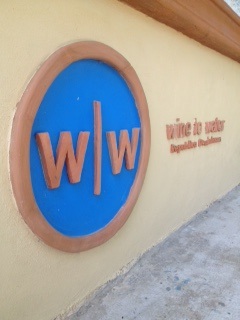The statistics are sobering, nearly 700 million or 1 in 10 human beings on this earth lack access to safe water. Water-related disease impacts 1.5 billion every year and claims the life of a child every 90 seconds. Over 160 million children suffer from stunting and chronic malnutrition linked to dirty water and poor sanitation.
Let me be clear. The world’s water crisis is big and daunting, but it’s very solvable. It’s solvable, one drop, one filter, one person, one family, and one community at a time.
Water is life, and clean water is hope. But where does one begin to offer such hope?
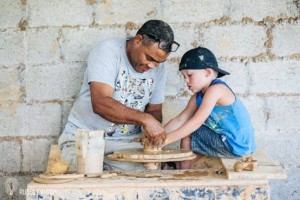
For starters, by loving those in need and supporting the unsung heroes, like Radhames Carela from the Dominican Republic, who truly are making a real difference in Hispaniola and beyond – one water filter at a time. This past week, I had the honor of getting to know Radhames and his wonderful family – wife Maria and their three beautiful daughters, Maria, Radhi, and Melissa – during a week-long Wine to Water volunteer project near Santiago DR. I traveled there with my two daughters, Ragan and Macy, wanting to share with them what the world’s water crisis looks like, how it impacts the daily lives and dreams of children and families, and how one person can make a difference in the lives of so many.
My girls and I arrived with few expectations and many reservations, but departed with great hope and optimism for a better future. Needless to say, we are different from when we arrived and we possess an enduring image of the opportunity that awaits. And the 100 families or so who received filters this past week are better off, because those filters will help prevent sickness and disease too prevalent in these areas. In the DR, most drinking water outside of the major cities comes from rain or is municipally provided, but most of it is not chlorinated and unsafe to drink due to dangerous coliform bacteria and parasites. But surprisingly, in this country of 8.8 million, many are still compelled to get their water directly from the local rivers, polluted by raw sewage.
Each ceramic filter costs about $50 USD to make. One filter provides clean water for up to 10 years – that’s $5 per year for clean water for a family. The filters are distributed in the DR and sold to beneficiaries based on what they can afford, typically 150 pesos, which for many is a lot of money, particularly where the median household income is 9,500 pesos or $517 USD per month. The filters are also distributed in Haiti where the MHI is even far less, $409 USD per year. Some may question why the filters are not simply given away for free, but the reason lies in the pride of ownership and respecting the dignity of the beneficiaries.
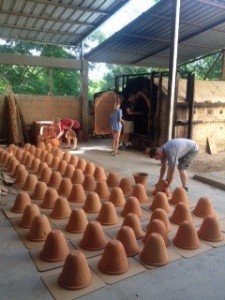
On Wednesday, the day we arrived, a small group from Carnival Cruise Line’s Fathom was gathered under the mango tree next to the factory, preparing to head back to the boat. I had the chance to speak briefly with Josh Fowler and his family, from South Carolina, who had just toured the factory that produces nearly 3000 clay filters each year. Although the Fowler family had never heard of W/W before the Fathom excursion, you could sense they had seen and experienced something special.
Most are probably unfamiliar with the brewing controversy of Western volunteerism in developing countries – I was. As one critic wrote in The New York Times:
The problem with [volunteerism] is that it treats receiving communities as passive objects of the visiting Westerner’s quest for saviordom. Even more vile is its reliance on poverty as a visible spectacle.
The critics of volunteerism would rather you donate your money than your time, due to the unintended harm that can be caused by “unaware” or culturally insensitive volunteers. At a time when most humanitarian organizations are moving away from volunteers, W/W is embracing theirs, because the organization’s leadership firmly believes that “serving in community” is the only way to solve the world’s water crisis.
For those interested in learning more about this heated topic, here’s a more balanced perspective on the controversy and what it means to “do good” in countries that need all the volunteers and acts of kindness that they can muster. See also Aware Volunteer.
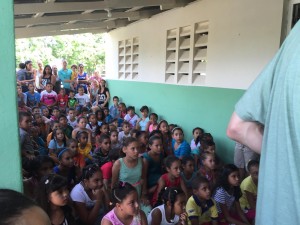
The communities in which W/W serves (East Africa, Cambodia, Amazon, and Nepal) are embraced with dignity and respected as fellow sojourners on this earth. As Doc Hendley, founder of W/W, is fond of saying, “fight death” – and Doc and his team are doing just that, fighting death through life-giving water.
Admittedly, there were moments where nagging questions abounded in my own private thoughts about the value of volunteers. My questions dealt less with concerns surrounding the cultural sensitivities, because W/W had well prepared me and the volunteer team on how to think about the purpose of our mission and how to engage with the local community. Rather, my concerns stemmed more from the practical realities. Radhames and his employees – Domingo, Luis, Lucy, Jesús, Fanny, and Ingrid – are experts at making filters and running a filter factory, the volunteers aren’t. Yet, each of them patiently offered instruction on how to mix the clay, sawdust, and silver, use the hydraulic press to form the filters, and clean, handle, box-up the finished filters, and how to engage with the DR people. Time is precious and Radhames and his team could make many more filters than we could, thereby saving and touching many more lives.
I was conflicted by the euphoric feeling that comes from helping with the pragmatic realities and limitations of volunteerism. I felt a strong reluctance to even give voice to my doubts out of respect to those around me who were there, present to serve, and experiencing those same positive feelings that one gets from “helping.”
One afternoon on the way into Santiago with Radhames to purchase supplies for a new table, I summoned the courage to ask him what value he saw in working with volunteers. Perhaps picking up on my internal turmoil, he didn’t hesitate in dispossessing me of any lingering concerns that I had. His response, in his wonderful broken English, was simple, “If the volunteers don’t come, they can’t experience the love we have and want to share with others in the world through clean water. We need them to go back and share this with their family and friends.”
This was that “aha moment” for me. While the simple act of donating money is two-dimensional and transactional, the act of volunteering is three-dimensional and relational, with the attendant senses of seeing, touching, smelling and feeling. Those unique and special leveling qualities that connect and make us all human.
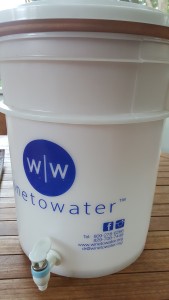
Money alone cannot fix the problem, but love covers all (one of the 5 guiding principles of W/W volunteer trips).
Radhames, just like me and the other volunteers, possesses the same human desire to help others through sharing God’s love. He doesn’t consider himself simply a beneficiary of Western donations and volunteers destined for the DR. He too is a volunteer in a sense. His compassion and love is not limited to his home country, but all corners of the earth where the needs and opportunities are real. He has a real solution to the world’s water crisis and feels compelled to share it with others and needs the help of others who share his passion and compassion.
It was during that ride to Santiago that I realized my notions and assumptions about my own purpose for being there in the DR as a volunteer were misguided and upside down. I feel no shame in acknowledging my personal misgivings, but rather am thankful for the opportunity to serve, without which this realization would not have occurred.
My hope and prayer for those who read this post is that you will seek out the opportunity to serve as a W/W volunteer. You won’t regret it. As my oldest daughter, Ragan, commented upon landing back on American soil, “it was the best week of my life.” That’s about all that needs to be said.
A special thank you to Lisa Merrit and Josh Elliot, W/W project leaders; volunteers from Crestwood Church in Lincoln Nebraska (Deidre, Lisa, AJ, Melanie, Diane, Tonia, and Craig); James Smith from Oxford, Alabama; Elyse DeBuck from Houston, Texas; Mike and Kathleen Hodge from Lodi, California (and owners of Twisted Root Winery); and the Reed family from Chapel Hill, NC (Michael, Christine, Lucas and Kaitlyn), for making this past week such a memorable and meaningful experience.
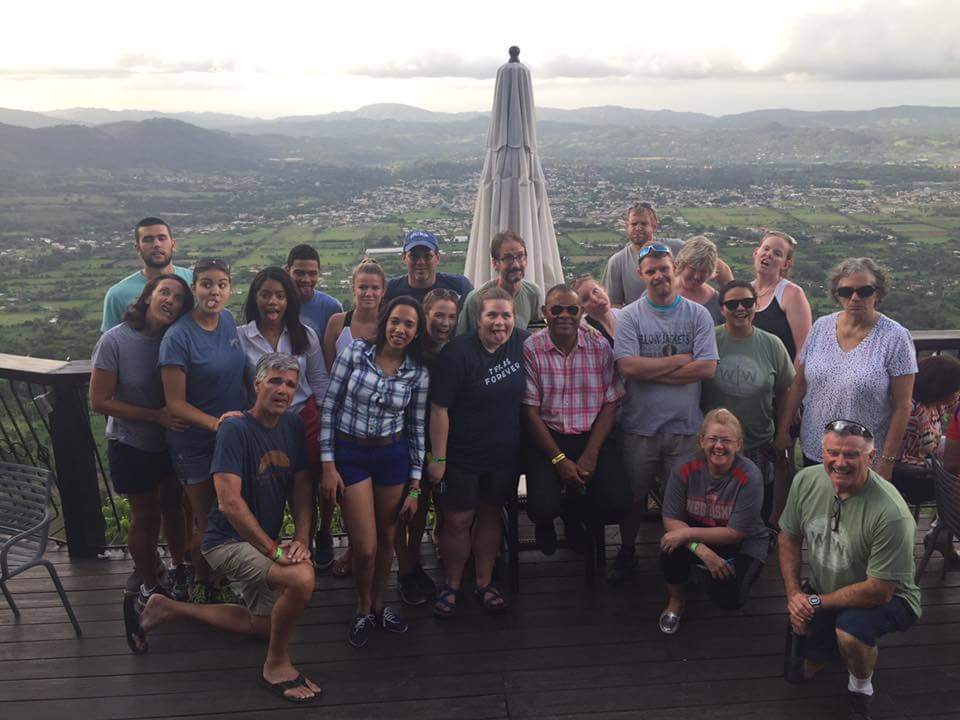 And a special thank you to Lisa Ballantine, without whom this DR story would not have been possible.
And a special thank you to Lisa Ballantine, without whom this DR story would not have been possible.
[Updated June 4 at 10:23]

